- Home
- Michael Gruber
Night of the Jaguar jp-3 Page 2
Night of the Jaguar jp-3 Read online
Page 2
“I do. We have no word for this, as you know, but when I was down the river as a boy, I learned this word and I felt the feeling twisting in my heart.”
“Yes, well, it comes with the territory, but I never realized what it would mean. No one to talk to, no books, no sound of your native tongue in your ears. I didn’t realize how much I was suffering until she arrived with her jeep and her bags of medicines and her American voice.”
“You took her in your hammock.”
“No, she took me inher hammock: yes I know, it’s very siwix to do so, but we were depraved. She only had to ask me once, this was after the car bombing, and we were shaking in terror as we removed our clothes. She knew everything and I knew nothing and so we continued in love until she conceived a child. Tell me, if I say abortion, do you know what I’m saying?”
“No, what does it mean?”
“A child that is unwanted and the woman gets rid of it?”
Moie’s face lit with comprehension. “Ah, yes, you mean hninxa, a girl baby is given to Jaguar.” Moie knew that the priest did not approve of this practice, but he also knew that the dead are beyond anger.
“Yes, I suppose it is similar, but in our case the baby was given to the Cali Water and Sewer Authority. Ah, now I see that while the dead can’t lie, they can still feel shame. I told myself that this baby would be the ruin of important work, if this should be discovered, I was a famous figure in the region, a symbol of those who wished to defy the land thieves and drogeros, and this was more important than just one baby. So she came back, and we continued, but after that it wasn’t the same. Still we clung to it, hating and loving at the same time; and you have no idea what I am talking about. But later, of course, someone told the bishop, and there was an investigation, by the police, no less. A thousand murders a year in Cali and hardly one of them solved, but they had time for my abortion. So they sent me back to America, or they tried to, but when I was at the airport I could not bear the thought of going back and being thrown out, I feared the contempt and the pain I would cause more than I feared the prospect of damnation and so at the last moment I changed my ticket and took a different plane, not to Bogota and Los Angeles but the one to San Jose del Guaviare, and from there I walked south, into the forest. I meant to walk along the river and fish, until God took me, but instead I found you. It seems, however, that I was always meant to be shot by a thug, and so despite my wretchedness and dishonor I have been given the grace of being allowed to die for the people. Blessed are the ways of the Lord.”
“So this is what you wanted to tell me? About how you came here?”
“Not at all, that was nothing. What I had to tell you is that you and all your people are in great danger. The dead people plan to build a road and bridge your river and come into the Puxto and destroy it.”
“But how can they do this? The Puxto is ours forever. It is a native reserve. Or so you have always said.”
“Oh, yes, it is a reserve, the whole mesa is protected by law. But greed will find a way. There is a company that wants your trees. The Puxto has one of the last great stands of virgin tropical hardwoods in Colombia. Bribes have been paid. You don’t understand what I am saying, do you?”
Moie made the upward chin-tilt that the Runiya use to indicate bafflement.
“All right,” said the priest. “You know what money is, yes?”
“Of course! I have lived with the dead people and am not an ignorant man. It is leaves with the faces of people or animals on them. You work and they give them, and then you give them and get things. A dead man gives some money to another dead man and he gives him a machete, and another gives and he gets a bottle of pisco.”
“Very good, Moie, you’re practically an economist. So let’s say one of those leaves you saw is a thousand-peso note. Three of those leaves are the same as one of the leaves from my part of the land of the dead, which we call a dollar.”
“Yes, I have heard that word.”
“I’ll bet. There’s no escape from it. Now a one-thousand-peso note buys a bottle of pisco, and ten of them buys a machete. And a piece of ry’uulu wood, what they call big-leaf mahogany, just so big”-here the priest sketched a cubic meter in the air-“is worth fifteen hundred dollars.” The priest translated this sum into pisco and machetes, so many hands of each, hands of hands of hands of machetes and bottles of cane liquor, and the living man laughed. “That is insane,” he said. “No one could ever wear out that many machetes, and ten hands of people could not drink that much pisco in their whole lives.”
It was hard to stop giggling, although he knew it was impolite to laugh in the presence of the dead, but he couldn’t stop thinking of all those wai’ichuranan reeling drunk and waving clusters of machetes in both hands.
When he sputtered into silence, the priest continued. “Yes, insane, but also the truth. They want the ry’uuluan and the other big hardwoods and they will come up to the Puxto on their road and cut every tree they find, rip the forest down to bare red earth, and when the government comes and tells them they have done wrong they will say, oh, we’re sorry, and pay a fine-thirty dollars a tree and they will take the dead trees away, laughing. That is how it’s done. And if you try to stop them they will shoot you all, as they have shot me.”
Moie let these words into his ears but they had no grip on his mind, for to say that the Puxto could be destroyed was like saying the sky could be brought down or the air turned into water. The dead man seemed to read his mind (nor did this surprise him) and said, “Yes, they surely can, they have machines that cut like many hands of men at once and they will do it unless they are stopped. This is why I went to San Pedro and this is why they killed me.”
“I will go to San Pedro, too,” said Moie, “and I, too, will tell them to stop this. Perhaps they will not kill me as easily.”
“I believe they would have some trouble killing you, but even so, it will do no good. I was a fool to think it. No, the men in San Pedro are only little twigs of the thing. Even those in Bogota are only the branches. To stop it one must go to Miami in America, my homeland, where the great trunk and roots of the thing are, and let everyone there know what is happening in the Puxto. But I am dead now and there is no one else to go.”
“I will go.”
“Oh, my friend, you don’t know how far it is, and you can’t speak their language…”
“I can. I speak the language of the wai’ichuranan very well.”
“No, you speak Spanish very badly, with many words in Quechua and your own language, and it is good enough to speak with me, but they would only laugh at you at the Consuela office.”
“What is this Consuela office?” Moie was upset by these words. It had been a long, long time since anyone had laughed at him.
“It is…it is like a hunting band of the wai’ichuranan, and they hunt for dollars, and hunt and hunt and as much as they get they are never satisfied, they never say we have enough, let us sing and eat until it is all gone, as you alive people do.”
“Because they are dead.”
“Indeed. Because they are dead. Now let me tell you one more thing. Who knows, some miracle may still happen, someone from outside will take notice and will come here to help. I will say the names of the men who are in control of Consuela Holdings LLC. It is not a thing well known because such men are like anacondas, they hide in the shadows and take their prey by stealth, they grab and then they strangle. So you must remember. Can you do this?”
In answer, Moie plucked a fiber from the floor mat and held it up, and said, “Say their names!” The priest said four names, and as each one fell into the air, Moie knotted it into the fiber. When the last had passed the dead lips, a change came over Father Perrin. His eyes opened wide and he stared, as if something wonderful was about to arrive, the look of a child given a piece of salt to lick. Then he fell back into the hammock, and Moie saw his death depart in good order and felt greatly relieved.
After this, Moie had to wait for an interval before he w
as in a state to talk to live people again, and he passed the time in thinking about the late Father Perrin and Jaguar and cosmology. That was one of the words he had learned in his conversations with the priest. He had not known that there even was a language to talk about such things, for the ordinary speech of his people was inside their lives; they told the stories of how the world came to be, and for those things that could not be uttered there was music and dancing. Moie and his fellow jampirinan had the holy speech, yes, but that was used only to intercede with the spirit world and influence it to help the people. As far as Moie knew, no Runiya had ever stood with his mind outside of everything that there was and looked at it whole, like a woman looks at a yam. It was frightening, but exhilarating as well.
Moie had heard that in other villages, the first thing the wai’ichura missionaries did was to tell the people that everything they believed was false, and that only the story they told of Jan’ichupitaolik was true, and they gave food and things to the people so that they would see that the missionaries were right and that Jan’ichupitaolik didn’t like to see people without clothes, and also hated the things that people had always done to keep harmony with the spirit world. Father Perrin was not a missionary of that kind, not a missionary at all, as he often said, and he thought that the Runiya were mostly fine as they were. He said that Jaguar was nearly the same as Jan’ichupitaolik and that Earth was nearly the same as the Father and that Rain was nearly the same as the Holy Spirit, but that Jaguar didn’t want the Runiya to give him little girls to eat anymore, that was the one thing that made him angry. When Jaguar ate a girl, Father Perrin would take his rod and go fishing, sometimes for days, and not talk to Moie at all. Afterward, he would forgive Moie and make him promise not to do it anymore, and Moie would try to explain that he was not the master of Jaguar, that Jaguar came when he would and that nothing could stop him. Father Tim refused to accept this. It was a theological difference (another useful word).
Forgiveness also confused Moie, as did Father Perrin’s idea that love rather than power was the ruling force of the world. One had enemies, and the duty of a man was to destroy them if he could and to appease them if he could not. The idea that one should love enemies seemed insane to him and not ryuxit. Father Perrin said that the wai’ichuranan didn’t have that word, but only words for little pieces of it, like harmony, beauty, peace, and bliss. Moie knew that the world was ruled by ryuxit, the harmony of the different children of Jaguar, tree rock snake fish bird all together with humans. What was not ryuxit was siwix, those things that were disharmonious and therefore forbidden. One might love that which was ryuxit, as one loved a woman, but one could not love siwix things, that was a contradiction. A paradox. Father Perrin had taught him that word, too, meaning things that could be true and not true at the same time, like something being wet and dry or light and dark. Father Perrin said that Rain, Earth, and Jaguar were all separate but at the same time one and the same. I will make you a theologian before I die, he used to say; that was what the dead people called their jampirinan. Moie was not so sure about this, for such thoughts made his head ache, but still the idea plucked at his mind, and he could see that there was something in it beyond his power to express. According to Father Perrin, Jan’ichupitaolik could love siwix, and by loving it, he changed it into ryuxit, and not only that, but a better ryuxit than had been before.
Moie would have certainly dismissed all of this as dead people’s nonsense, if he had not visited Father Perrin’s spirit in a dream shortly after the priest had arrived at Home. There he found not the shriveled sad soul characteristic of the wai’ichuranan, but something immense and powerful, ryuxit beyond ryuxit. So he had let the man live in Home and set up his church and had taught him as much as he thought proper about the ways of the Runiya and ofaxa’jampirin, the path of the spirits, and he had learned much about the axa’jampirin of the dead people.
Now Tim was dead, and with Jaguar above the moon, or in heaven with his God, and perhaps this was really the same thing, as Father Perrin had often suggested. Moie sighed and rose and looked at the corpse. The flies and cockroaches had found the body already, they were busy laying their eggs in eyes and mouth and nibbling in dark squirming clots at the torn flesh around the three wounds. He called out and men came in and they took the body down to the river. There Moie made the ritual cuts and filled the body cavity with six large round white stones and drilled a hole into the brain to prevent a witch from reanimating it, and then they sang the funeral songs, as they would have for one of their own, and gave the body to Rain through her child, the River.
The church was sealed up, both physically with mats and ropes and against spirit invasion by Moie, using secret means. No human person would loot there, nor would any mischievous spirit come to feed on the spiritual detritus of the former inhabitant. There was the usual party that night, with food, chicha, and dancing, for Father Perrin was well liked in Home and also the moon was full, which was always propitious. A person who died at the full of the moon was a friend of Jaguar and so to be especially honored. Moie drank less than usual at the wake, and left while the dancing was still going on. He went on trails his feet knew well, although the moonlight barely penetrated the heavy canopy of foliage and it was dark enough that he could see little floating bright specks, as if his eyes were shut. After a while the ground beneath his feet grew harder, more rocky, and the trees grew shrubbier, and then he was on the limestone escarpment that rose above the rain forest in the center of Puxto mesa. From here he had an unobstructed view of the night sky and this was by design, for the people had always kept this small area clear of growth, as it was sacred to Jaguar and served the Runiya as both a cathedral and an observatory, although with a congregation or astronomical staff of only one.
In the center of this space was a long, low white boulder, almost the shape of a crouched cat, upon which, soon after the creation of the universe, First Man had carved an image of his maker. First Man had made the head and ears, made the mouth open, and placed two large natural emeralds in the eye sockets. He had incised the rosettes all over it as well, and these had grown dark moss in them, so that the effect was startlingly lifelike at night.
Moie sat on a low stone before this image and took two nostrils of yana and sang his name song in a loud clear voice, asking permission to speak to his god. Jaguar was hiding now behind clouds that blew past him like palm fronds in a storm. He peeked out, for a moment, then again, and now a long cloud tore away and he shone clear against the black sky, the two deep eyes, the muzzle and its curving mouth, the spotted face and net of whiskers. In the holy language, Moie prayed for aid for himself and his people, and after some time had passed Jaguar swelled and grew brighter and descended from the heavens to his image below.
The god listened while Moie told his tale, of the priest and his death and the danger he had foretold. Then the Lord Jaguar spoke, the voice seeming to emerge from the stone jaws. He said, Moie, you must go into the land of the dead and tell the dead people that this is forbidden to them. Say that the Puxto is for me and the speakers of language, the Runiya, and not for the dead.
At this Moie trembled with fear and spoke, “Tayit, how can one human do this? The dead people are so many, and I don’t speak their language very well. They will laugh at me and turn me away from their village.”
Jaguar answered, I will provide you with allies from the dead people who will speak my words for you. And if the lords of the dead people do not do as I demand, I will slay them and feed on their livers. Now drive the fear from your own heart, Moie, for I will go with you and my strength will be yours. And the Lord Jaguar told him other things that would help him on this journey. Then Jaguar sent a part of himself leaping from the stone mouth and it entered Moie through his nostrils and Moie fell senseless on the ground.
When he came to himself again it was dawn, dull and overcast with a chilling mist. Moie rose and walked back down to the village, slapping his arms and chest to restore feeling. Fear was throbbi
ng deep in his belly, but it didn’t rise to his heart, because Jaguar was there. The village was asleep, silent but for the sounds of the animals, the clucking of the chickens and the grunts of the pigs oddly muffled by the mist. He thought briefly about what the people would say when they found him gone. Some other jampiri would no doubt try to take his place and the people would either accept him or not, or there might be a struggle between two jampirinan and some Runiya might be harmed. In any case he might have died on any day, not that there was much difference between dying and what he was about to do. He would have liked to turn his profession over to an apprentice, but he had none. Jaguar had not marked any boys for that in a long time.
Arriving at the church, he tore down the matting and went in. There was a cloth suitcase in the room where the man had died. Moie took it and the priest’s clothing and fishing tackle and went back to his compound. Pucu, the younger of the two women, was already awake. “Where are you going?” she asked.
“Away. Put some food in a basket.” As she did so, he gathered the materials of his profession into a net bag, and also took his blowgun and darts and a water skin of peccary with the fur still on it.
“When will you be back?” she asked. He looked at her and made his expression stern, although he ached to think that this sweet young face was the last face of his people he would ever look upon. He roped his burden into a convenient pack and said, “When you see me return you will know,” and strode off.

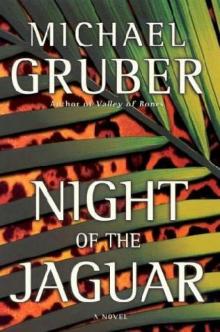 Night of the Jaguar jp-3
Night of the Jaguar jp-3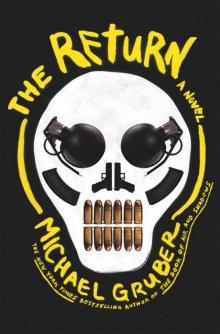 The Return: A Novel
The Return: A Novel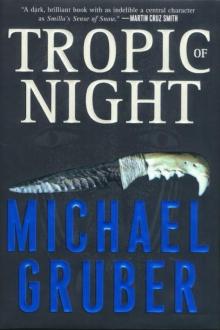 Tropic of Night jp-1
Tropic of Night jp-1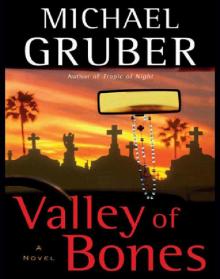 Valley of Bones
Valley of Bones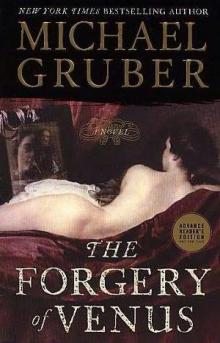 The Forgery of Venus
The Forgery of Venus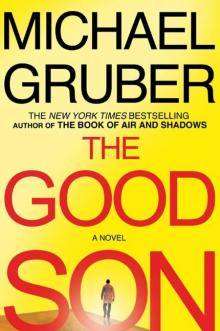 The Good Son
The Good Son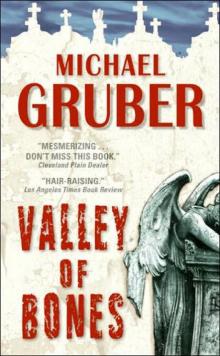 Valley of Bones jp-2
Valley of Bones jp-2 Night of the Jaguar
Night of the Jaguar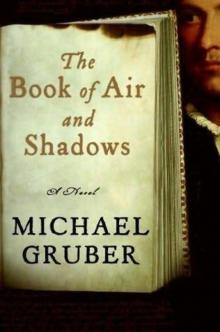 The Book of Air and Shadows
The Book of Air and Shadows